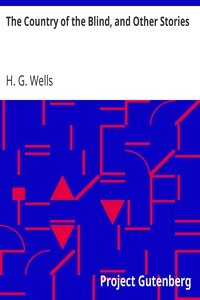The Country of the Blind, and Other Stories, H. G. Wells [top 10 books of all time TXT] 📗

- Author: H. G. Wells
Book online «The Country of the Blind, and Other Stories, H. G. Wells [top 10 books of all time TXT] 📗». Author H. G. Wells
He gave me his narrative, I may state, at my house at Chislehurst, and so soon as he had left me that evening, I went into my study and wrote down everything as I remembered it. Subsequently he was good enough to read over a type-written copy, so that its substantial correctness is undeniable.
He states that at the moment of the explosion he distinctly thought he was killed. He felt lifted off his feet and driven forcibly backward. It is a curious fact for psychologists that he thought clearly during his backward flight, and wondered whether he should hit the chemistry cupboard or the blackboard easel. His heels struck ground, and he staggered and fell heavily into a sitting position on something soft and firm. For a moment the concussion stunned him. He became aware at once of a vivid scent of singed hair, and he seemed to hear the voice of Lidgett asking for him. You will understand that for a time his mind was greatly confused.
At first he was under the impression that he was still standing in the class-room. He perceived quite distinctly the surprise of the boys and the entry of Mr. Lidgett. He is quite positive upon that score. He did not hear their remarks; but that he ascribed to the deafening effect of the experiment. Things about him seemed curiously dark and faint, but his mind explained that on the obvious but mistaken idea that the explosion had engendered a huge volume of dark smoke. Through the dimness the figures of Lidgett and the boys moved, as faint and silent as ghosts. Plattner's face still tingled with the stinging heat of the flash. He, was, he says, "all muddled." His first definite thoughts seem to have been of his personal safety. He thought he was perhaps blinded and deafened. He felt his limbs and face in a gingerly manner. Then his perceptions grew clearer, and he was astonished to miss the old familiar desks and other schoolroom furniture about him. Only dim, uncertain, grey shapes stood in the place of these. Then came a thing that made him shout aloud, and awoke his stunned faculties to instant activity. Two of the boys, gesticulating, walked one after the other clean through him! Neither manifested the slightest consciousness of his presence. It is difficult to imagine the sensation he felt. They came against him, he says, with no more force than a wisp of mist.
Plattner's first thought after that was that he was dead. Having been brought up with thoroughly sound views in these matters, however, he was a little surprised to find his body still about him. His second conclusion was that he was not dead, but that the others were: that the explosion had destroyed the Sussexville Proprietary School and every soul in it except himself. But that, too, was scarcely satisfactory. He was thrown back upon astonished observation.
Everything about him was profoundly dark: at first it seemed to have an altogether ebony blackness. Overhead was a black firmament. The only touch of light in the scene was a faint greenish glow at the edge of the sky in one direction, which threw into prominence a horizon of undulating black hills. This, I say, was his impression at first. As his eye grew accustomed to the darkness, he began to distinguish a faint quality of differentiating greenish colour in the circumambient night. Against this background the furniture and occupants of the class-room, it seems, stood out like phosphorescent spectres, faint and impalpable. He extended his hand, and thrust it without an effort through the wall of the room by the fireplace.
He describes himself as making a strenuous effort to attract attention. He shouted to Lidgett, and tried to seize the boys as they went to and fro. He only desisted from these attempts when Mrs. Lidgett, whom he (as an Assistant Master) naturally disliked, entered the room. He says the sensation of being in the world, and yet not a part of it, was an extraordinarily disagreeable one. He compared his feelings, not inaptly, to those of a cat watching a mouse through a window. Whenever he made a motion to communicate with the dim, familiar world about him, he found an invisible, incomprehensible barrier preventing intercourse.
He then turned his attention to his solid environment. He found the medicine bottle still unbroken in his hand, with the remainder of the green powder therein. He put this in his pocket, and began to feel about him. Apparently he was sitting on a boulder of rock covered with a velvety moss. The dark country about him he was unable to see, the faint, misty picture of the schoolroom blotting it out, but he had a feeling (due perhaps to a cold wind) that he was near the crest of a hill, and that a steep valley fell away beneath his feet. The green glow along the edge of the sky seemed to be growing in extent and intensity. He stood up, rubbing his eyes.
It would seem that he made a few steps, going steeply downhill, and then stumbled, nearly fell, and sat down again upon a jagged mass of rock to watch the dawn. He became aware that the world about him was absolutely silent. It was as still as it was dark, and though there was a cold wind blowing up the hill-face, the rustle of grass, the soughing of the boughs that should have accompanied it, were absent. He could hear, therefore, if he could not see, that the hillside upon which he stood was rocky and desolate. The green grew brighter every moment, and as it did so a faint, transparent blood-red mingled with, but did not mitigate, the blackness of the sky overhead and the rocky desolations about him. Having regard to what follows, I am inclined to think that that redness may have been an optical effect due to contrast. Something black fluttered momentarily against the livid yellow-green of the lower sky, and then the thin and penetrating voice of a bell rose out of the black gulf below him. An oppressive expectation grew with the growing light.
It is probable that an hour or more elapsed while he sat there, the strange green light growing brighter every moment, and spreading slowly, in flamboyant fingers, upward towards the zenith. As it grew, the spectral vision of our world became relatively or absolutely fainter. Probably both, for the time must have been about that of our earthly sunset. So far as his vision of our world went, Plattner, by his few steps downhill, had passed through the floor of the class-room, and was now, it seemed, sitting in mid-air in the larger schoolroom downstairs. He saw the boarders distinctly, but much more faintly than he had seen Lidgett. They were preparing their evening tasks, and he noticed with interest that several were cheating with their Euclid riders by means of a crib, a compilation whose existence he had hitherto never suspected. As the time passed, they faded steadily, as steadily as the light of the green dawn increased.
Looking down into the valley, he saw that the light had crept far down its rocky sides, and that the profound blackness of the abyss was now broken by a minute green glow, like the light of a glow-worm. And almost immediately the limb of a huge heavenly body of blazing green rose over the basaltic undulations of the distant hills, and the monstrous hill-masses about him came out gaunt and desolate, in green light and deep, ruddy black shadows. He became aware of a vast number of ball-shaped objects drifting as thistledown drifts over the high ground. There were none of these nearer to him than the opposite side of the gorge. The bell below twanged quicker and quicker, with something like impatient insistence, and several lights moved hither and thither. The boys at work at their desks were now almost imperceptibly faint.
This extinction of our world,





Comments (0)